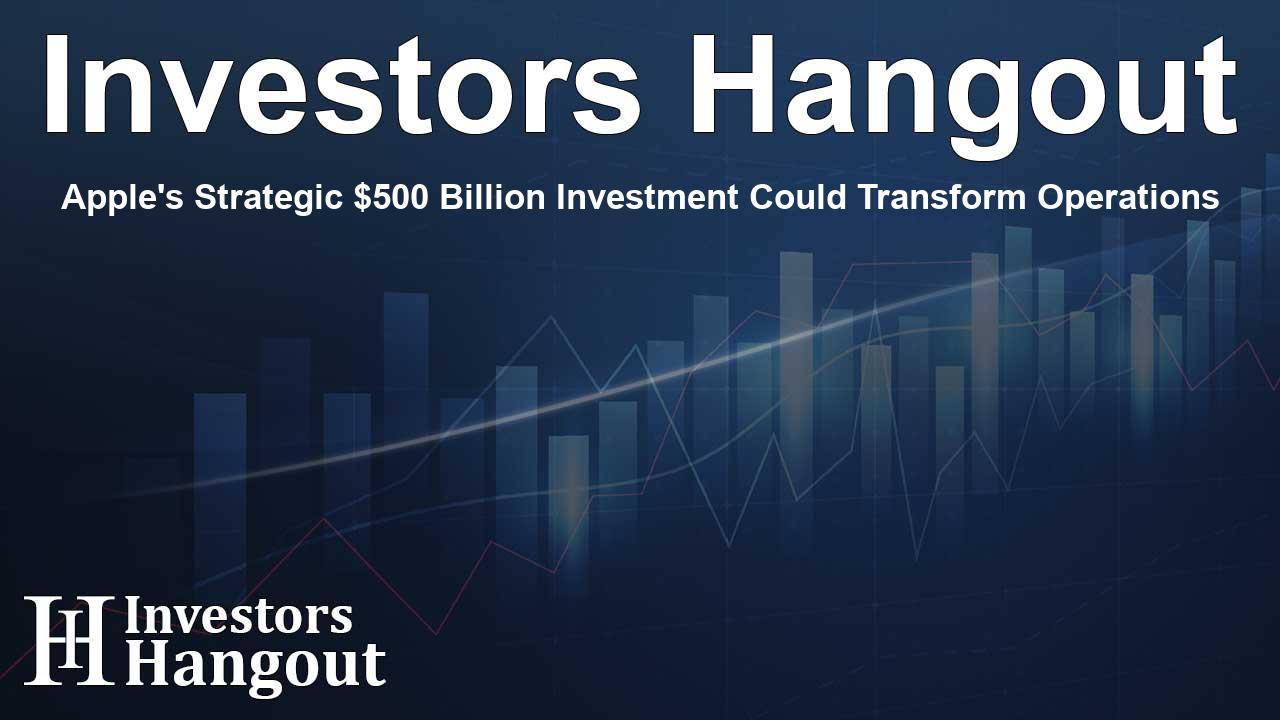Apple's Strategic $500 Billion Investment Could Transform Operations

Apple's Bold Move: A $500 Billion Investment
Gene Munster from Deepwater Management recently shared an insightful analysis of Apple Inc.'s latest pledge to invest $500 billion in the U.S. This substantial commitment marks a significant shift for Apple as it navigates the complex landscape of tariffs and infrastructure demands.
Investment Breakdown and Its Implications
Munster highlighted that this decision could elevate Apple's U.S. investments by an impressive $39 billion annually, representing a 45% increase compared to its 2021 levels. However, the seasoned analyst suggests that a more accurate approximation of the true annual increase is around $20 billion instead.
Infrastructure and Workforce Enhancements
This ambitious investment underscores Apple's recognition of the need for robust infrastructure to support an AI-driven future. Munster estimates that 15% of the additional spending will be allocated towards hiring an impressive 20,000 new employees, which translates into an additional $3 billion in annual salary commitments. The majority, about 85%, will be directed towards enhancing infrastructure, particularly expanding the data center capabilities and bolstering chip production for devices like Apple Watches and iPads.
Strategic Tariff Avoidance Through Domestic Investment
One of the core reasons behind Apple's strategic investment plan is to circumvent potential tariffs, thereby reallocating those savings into further U.S. investments. Munster estimates that approximately 35% of Apple's total sales are generated within the U.S. market, equating to roughly $147 billion in anticipated revenue for the current year. Of this revenue, approximately $120 billion comes from product sales susceptible to tariff impacts. By focusing on domestic production, Apple could avoid an estimated $11 billion in annual tariff charges, effectively covering half of its announced $19 billion additional investment.
CEO Tim Cook's Vision for Growth
Tim Cook, Apple's CEO, is firmly committed to this massive investment as a clear strategy to shield the company from tariff-related pressures. Analysts have voiced mixed reactions to this announcement, with Bank of America warning of potential price increases of about 9% on products such as iPhones and iPads to offset tariff implications. Furthermore, the investment aims to reassure stakeholders of Apple's long-term growth trajectory despite geopolitical challenges.
Responses from Analysts and Market Performance
Reactions from the analyst community varied considerably regarding the feasibility of Apple's $500 billion investment. David Vogt from UBS expressed skepticism, labeling the investment as lacking substantial focus, while well-known short-seller James Chanos deemed the aspiration unrealistic given Apple's existing capital base of less than $160 billion. In contrast, Dan Ives from Wedbush praised the decision as a smart strategic move, emphasizing its significance for Apple's U.S. operations.
Market Reaction to Apple's Announcements
Following these discussions surrounding the substantial investment, Apple’s stock price saw an increase of 0.66%, closing at $247.17. This uptick reflects a generally positive market sentiment towards Apple's commitment to enhancing its domestic operations and navigating financial challenges effectively.
Conclusion: A Transformational Strategy for Apple
Apple's decision to invest $500 billion in the U.S. marks a pivotal moment in its operational strategy, particularly in the context of adapting to tariffs and market demands. This bold investment could reshape the landscape of Apple’s operations and reinforce its status as a leader in the tech industry. By investing in workforce expansion and critical infrastructure, Apple is taking a proactive approach to ensure sustainable growth and continued innovation in a rapidly evolving market landscape.
Frequently Asked Questions
What is the significance of Apple's $500 billion investment?
Apple's $500 billion investment aims to boost its U.S. operations while avoiding tariffs, indicating a commitment to infrastructure and workforce development.
How much could Apple save by avoiding tariffs?
By increasing domestic investments, Apple could potentially save at least $11 billion annually by circumventing tariff fees.
What are the expected employment changes due to this investment?
Apple plans to hire around 20,000 new employees, which will result in an additional $3 billion in annual employee expenses.
How does this investment impact Apple’s market performance?
Following the investment announcement, Apple’s stock experienced a positive reaction, rising by 0.66% to a closing price of $247.17.
What do analysts think about Apple's investment strategy?
Analysts have expressed mixed views; some see it as a strategic move, while others question its feasibility and substance based on Apple's capital base.
About The Author
Contact Addison Perry privately here. Or send an email with ATTN: Addison Perry as the subject to contact@investorshangout.com.
About Investors Hangout
Investors Hangout is a leading online stock forum for financial discussion and learning, offering a wide range of free tools and resources. It draws in traders of all levels, who exchange market knowledge, investigate trading tactics, and keep an eye on industry developments in real time. Featuring financial articles, stock message boards, quotes, charts, company profiles, and live news updates. Through cooperative learning and a wealth of informational resources, it helps users from novices creating their first portfolios to experts honing their techniques. Join Investors Hangout today: https://investorshangout.com/
The content of this article is based on factual, publicly available information and does not represent legal, financial, or investment advice. Investors Hangout does not offer financial advice, and the author is not a licensed financial advisor. Consult a qualified advisor before making any financial or investment decisions based on this article. This article should not be considered advice to purchase, sell, or hold any securities or other investments. If any of the material provided here is inaccurate, please contact us for corrections.
